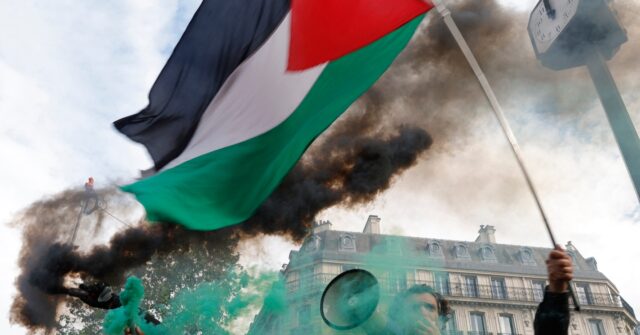Concerns over the breakdown of social cohesion, increasing violence, and the rise of Islamism have reached an “unprecedented level” in France, according to a survey which found over four in ten believe the country is heading towards civil war.
A survey from Ifop published in Le Figaro to coincide with the 120th anniversary of the passing of the Secularism Act of 1905 and the 10th anniversary of the Bataclan Islamist terror attacks in Paris in 2015, has found that the French public is increasingly sceptical of the multicultural project foisted upon the nation, with many fearing that their society may devolve into full-on chaos.
According to the poll, a record eight in ten people in France believe the country is at risk of experiencing a “social explosion” in the coming months.
While the “explosion” could come in the form of riots such as the ones experienced in 2023 following the police killing of an Algerian-heritage teen, or like the Yellow Vest or farmers’ protest movements, a staggering 42 per cent are concerned that it could come in the form of an outright civil war. The survey also found 39 per cent could envision an attack on the Élysée Palace (the residence of the French president) or the National Assembly.
In any event, the French public appears to be losing faith in their public institutions’ ability to withstand the growing turmoil, with six in ten expressing doubt over the government’s ability to maintain stability in the country. This comes as the National Assembly remains mired in a three-way split and in the wake of three governments collapsing since the start of last year.
One of the key drivers of the growing feeling of instability found by the survey was the spread of Islamist ideology throughout France. The poll found that 72 per cent were concerned about growing Islamism in working-class neighbourhoods, 70 per cent about it in prisons, 63 per cent in schools, 56 per cent in universities, and 52 per cent in sports clubs.
Islam in general was by far seen as the religion most likely to harbour radical positions at 63 per cent, compared to Judaism at 23 per cent and Catholicism at 16 per cent.
While the public was mostly tolerant towards some practices of the Muslim faith, such as praying five times a day and abstaining from alcohol, others, such as forcing young girls to wear veils or refusing to shake the hand of a person of the opposite sex, are seen as signs of radicalisation.
Other major factors seen as contributing to the breakdown in social cohesion surrounded issues of multiculturalism, with 88 per cent citing the “evolution of delinquency” on the streets of France, 82 per cent the “concentration of populations of the same culture or origin in neighbourhoods,” and 75 per cent pointing to the public spaces becoming “occupied by religions”. Outside of multiculturalism, only income inequality, at 77 per ent, was seen as playing a meaningful role in the cultural decay.
The growing concern over Islamism and multiculturalism appears to be having an impact on the political sphere. According to the survey, over eight in ten see the far-left La France Insoumise (France Unbowed) party of Jean-Luc Mélenchon as contributing to societal divisions.
Perhaps influencing this perception, supporters of the LFI, which has been an outspoken proponent of Gaza in the conflict with Israel, were the most likely to hold a positive perspective on radical Islam, with 36 per cent saying they would support Islamism.
Conversely, while the legacy media and the political establishment have long attempted to deride the National Rally as divisive and outside the bounds of acceptable politics, 39 percent of the public now sees Marine Le Pen’s anti-mass migration party as beneficial to France’s cohesion.
Follow Kurt Zindulka on X: Follow @KurtZindulka or e-mail to: [email protected]
Read the full article here
